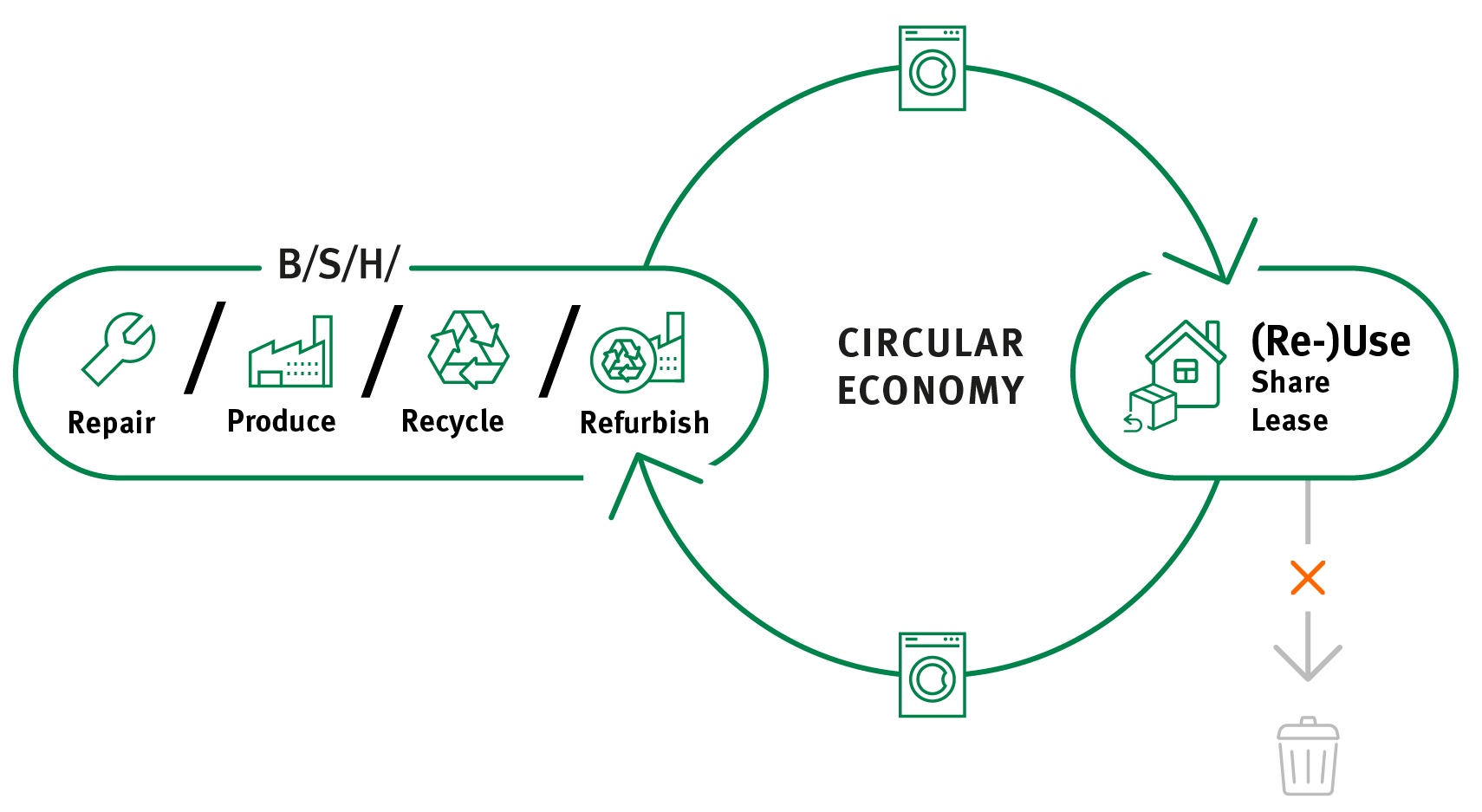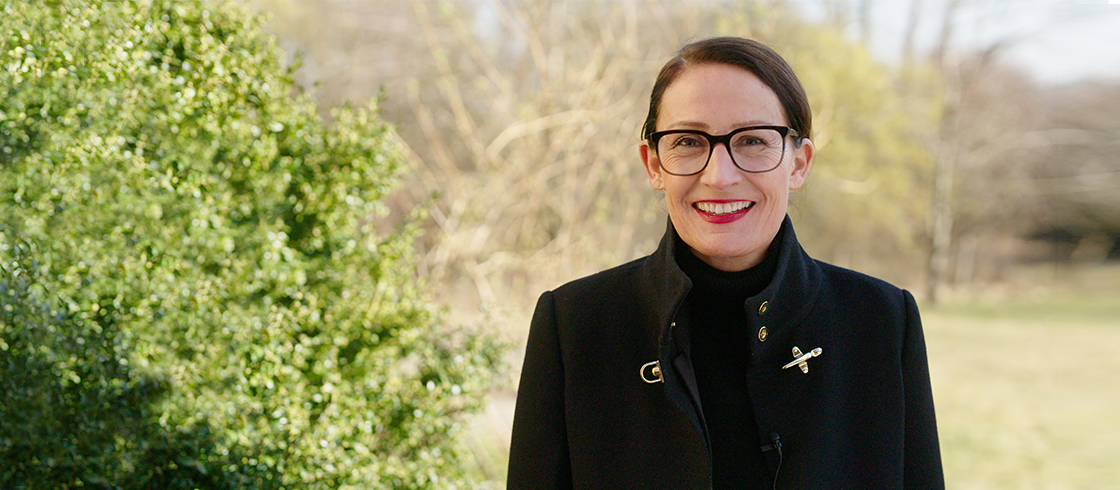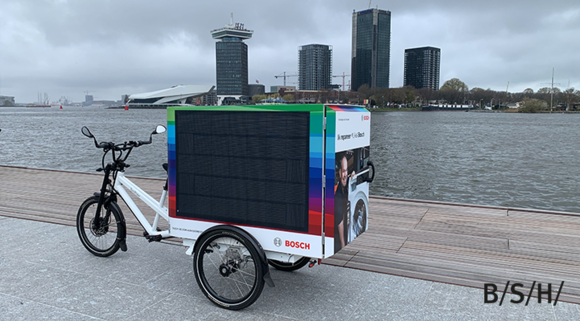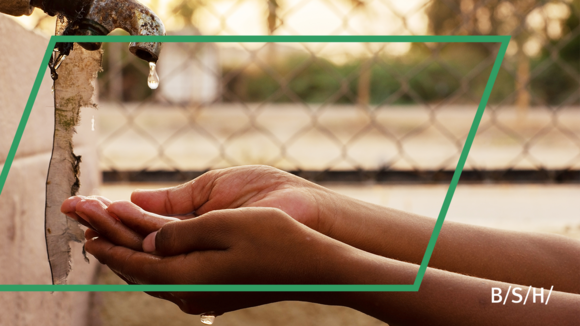Sustainability is not just our plan A – it’s plans B and C as well.
Reading time for this article: 11 minutes
How important is sustainability to BSH, and how does the company plan to follow through on its aspirations, both now and in the future? Why is the circular economy model the only sensible way forward for BSH? Christine Maria Betz, Chief Sustainability Officer at BSH, gives us the answers to these questions and surprises us with her personal sustainability story.
Christine, you are Chief Sustainability Officer (CSO) at BSH. From a personal perspective, what motivates you to promote sustainable practices?
Christine Maria Betz: Sustainable action is essential for a company to make a positive contribution to society. Meeting the Paris climate targets is a key example of this. This is why a company like ours must do all it possibly can to ensure that our world remains a place worth living in for the generations to come. I’m therefore delighted to be part of the sustainability team at BSH.
Our sustainability strategy aims to show consumers, employees and society in general that protecting our climate and the environment – and exercising social responsibility – are no intrinsic obstacles to economic success. Quite the contrary, all these things must go hand in hand! At BSH, we believe that our influence on environment and society is just as important as our balance sheet. It is my firm conviction that sustainable operating practices are the only way companies, including BSH, will be able to safeguard their long-term market survival.
Why is the concept of a circular economy so important in this context?
Christine Maria Betz: Circular economy has a positive impact on all three dimensions of sustainability, which is why it is particularly important at BSH.
In essence, a circular economy means that products and materials enjoy second, third, or even fourth lives. But it necessitates a totally new way of looking at “used” commodities – viewing old or no-longer-wanted home appliances not as waste but rather as a secondary source of raw materials.

For example, when a consumer decides to replace a functioning washing machine with a newer model, the older appliance can be refurbished for further use. In the case of appliances that are no longer functional, it may still be possible to reuse components such as glass portholes, steel drums or concrete counterweights in other devices. This concept of recycling products and materials in a theoretically never-ending cycle has two huge advantages. Firstly, because old appliances serve as a source of raw materials for new ones, fewer finite resources are needed overall, cutting the risk of pollution. Secondly, refurbishing existing products requires less energy than manufacturing new ones, resulting in fewer harmful carbon emissions.
This is a first step on the road toward eliminating the throw-away mentality so prevalent in our society. And we are making a start there where are greatest strengths lie – in the midst of everyday life, in our homes.
“Reducing our ecological footprint is a major and crucial step. But I believe we need to think far beyond this in future by targeting nature-positive solutions. These represent an enormous opportunity.”
Where is BSH today with regard to its circular economy goal, and how do you intend to move forward?
Christine Maria Betz: Where are we today? Right at the center of the everyday lives of millions of people! And we have a huge influence on how sustainably these people live their lives. Our products enable them to save energy and water, benefit from flexible rental models, and experience on an everyday basis how our innovative ideas and eco-friendly solutions are making their lives easier.
The two circular business models we have already launched, BlueMovement and WeWash, have been extremely well received. Under the BlueMovement scheme, we rent out a wide range of efficient home appliances for washing laundry, refrigeration, or dishwashing, and a whole lot more. Customers can choose whether they want a new Bosch appliance or a refurbished one. The WeWash scheme provides efficient washing machines and dryers for communal laundry rooms, also allowing these to be booked online. Under both these models, we ensure that our appliances and components are refurbished or passed on for high-grade recycling after their period of use. These sustainable models have already won over a large number of European consumers. Over the next few years, we aim to progressively expand such circular business models to other countries around the globe, allowing even more people to benefit from them.
Which of BSH’s products, technologies or solutions in the circular economy area excite you the most?
Christine Maria Betz: There are quite a few of them. I’ve already touched on our BlueMovement and WeWash service brands, both examples of successful rental and sharing models.
WeWash not only enhances the attractiveness of drab communal laundry rooms, it also enables large numbers of people to access washing and drying facilities in an uncomplicated fashion. Anyone whose washing machine is broken, or is away from home for a longer period, quickly discovers the importance of access to a washing machine to obtain fresh clothing. And this appreciation has grown even more during the COVID-19 pandemic. The washing machines and dryers can be controlled via a simple app. They also consume only modest amounts of energy and water, so doing their bit for climate protection. WeWash is available in countries including Germany, Austria, Switzerland, Belgium and France.
Our BlueMovement service brand was launched in the Netherlands in 2017 and has been available in Germany since May 2021. Consumers are able to rent washing machines, washer-dryers, tumble dryers, fridges and freezers, dishwashers or vacuum cleaners for a fixed monthly fee. All appliances are extremely energy efficient and are collected by us at the end of the rental period for refurbishing or recycling.
Within the Papillon project we allow low-income families in Belgium to rent energy-efficient home appliances for a modest fee. People in challenging financial situations should not also be confronted with high energy bills for outdated and wasteful appliances. The project enables families to save money and enjoy greater convenience while also benefiting the environment.
The circular business models WeWash, BlueMovement and Papillon are forging a new path for BSH.
I would also like to draw attention to SmartGrow, our indoor herb garden. It’s a great example of what can be achieved through sustainable product design. SmartGrow enables people to grow herbs at home even when they don’t have a garden or balcony, or even a green thumb (laughs). The white SmartGrow containers in which the plants grow are made exclusively from recycled plastic. This also means that SmartGrow leaves a carbon footprint that is 50% lower than a herb pot purchased from the local supermarket.
My colleague E-Lin Tan, one of the many smart people behind this sustainable product, swears by SmartGrow and uses it to grow a variety of garden herbs for her family. I have even heard that her 8-year-old son sometimes chews herbs as if they were gummi bears.

What are the prerequisites for achieving a successful circular economy at BSH?
Christine Maria Betz: There are two essential factors. Firstly, we need to be able to feed products back into the material recovery cycle at the end of their usage period and reprocess them for further use, partially or in their entirety. If that isn’t possible, we need to ensure the products undergo high-grade recycling. Secondly, we need to ensure that our home appliances are developed from the very beginning with a view to easy disassembly, separation into individual components, and recycling after take-back. We have already drawn up the necessary materials strategy for this.
As a commercial enterprise, however, there’s one thing we can’t ignore: we need to earn money to cope with the enormous challenges that come with this transformation to uncompromising sustainability. This is the only way we can achieve real change.
What makes the circular economy so important for consumers, business partners and BSH itself?
Christine Maria Betz: We live in a world where it’s relatively easy to develop new habits. Our circular economy concept enhances the quality of life on our planet by enabling us to offer products, technologies and solutions that are significantly more sustainable. Step by step and day by day.
It’s crystal clear that there is no alternative to a more sustainable lifestyle. Circular economy models give everyone the opportunity to make a real contribution. From their own homes. And even the youngest among us can play their part. Like many other young people, my kids give real consideration to matters like the necessity of buying new clothes or the origin of the foodstuffs they consume. I sincerely hope that we can all learn to have a similar mindset.
In which areas of the circular economy does BSH still need to intensify its efforts and become a trailblazer?
Christine Maria Betz: Thinking innovatively and creating sustainable products is ingrained in our DNA. What we now need to do is make use of these qualities along our entire value chain. Our new circular sharing and rental models mean that we have gotten off to an excellent start. These innovations already give us an edge over many of our competitors. But we are also aware that there is still a long road in front of us.
Where do you think BSH can play a leading role?
Christine Maria Betz: Regardless of the particular BSH brand, our products are characterized by a high level of quality and are designed to be extremely durable. But I still have a vision of a washing machine that lasts forever because no part of it, however small, needs to be thrown away.
And it’s clear to me where we will play a leading role – in the home. That’s because we are BSH. It’s where our strengths lie. Every journey, including the trek to sustainability, begins at home. And that’s precisely where our endeavors will continue.
Christine, thank you for speaking to us.




